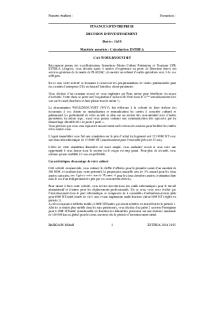The Self How would you describe yourself PDF

| Title | The Self How would you describe yourself |
|---|---|
| Author | Gabrielle LaRocca |
| Course | Psychology of Childhood |
| Institution | Syracuse University |
| Pages | 3 |
| File Size | 71.6 KB |
| File Type | |
| Total Downloads | 17 |
| Total Views | 148 |
Summary
notes on how children build their sense of self, at what developmental stages this occurs and problems involved with development of the sense of self. taught by woods...
Description
The Self: How would you describe yourself? Thursday, April 20, 2017
11:31 AM
Self - Self ○ A conceptual system made up of ones thoughts and attitudes about oneself - The self in infancy ○ Infants appear to have a sense of self § Sense of their ability to control objects outside themselves (2-4 months) § Understanding of their own bodily movements (3-5 months) □ They can move and it will effect the world § Separation anxiety (8 months) □ They know they are not the same as other people § Can follow a pointing finger to find an object and give objects to an adult in an apparent effort to engage the adult in activities (12 months) □ Joint attention starts - The self in early childhood ○ Sense of self becomes more apparent when children can look in a mirror and realize they are looking at themselves (age 18-20 months) § Smudge test 1 □ Smudge something on child's head, they wont recognize it because they don’t have a full understanding of their appearance □ Cant connect their image and behavior is mirrored back to them § Smudge test 2 □ Try again some time later, they will recognize themselves and be able to understand that they got some shit on they forehead ○ Exhibit shame and embarrassment and try to determine their own activities and goals independent of their parents (2 years) ○ Children also begin using language
-
○ that identifies them as an individual (2-3 years) The self in childhood ○ As children progress through childhood, their conception of themselves becomes increasingly complex ○ Susan Harter: § Studied children's typical self-descriptive statements at different ages § Three to four: □ Descriptions using concrete, observable characteristics □ Tend to be unrealistically positive □ Young children tend to use things they can do and things they have to describe themselves § Elementary school kids: □ Social comparison ® Comparing aspects of ones own psychological, behavioral or physical functioning to that of others in order to evaluate oneself; compare in terms of their characteristics, behaviors and possessions ® In elementary school, children's self-concepts are increasingly based on their relationships with others § Older children □ Self reflect cognitive advances in their ability to use higherorder concepts that integrate more specific behavioral features of the self □ This allows older children to construct more global views of themselves--results in a more balanced and realistic assessment of the self, although they can result in feelings of inferiority and helplessness □ Increasingly relies on others evaluations of them ® Specifically peers □ Descriptions will focus on social elements § Adolescents □ Recognizing different social groups and how your behavior changes around them ® "variety of selves" □ Not feeling the need to rationalize the negatives or immediately demonstrate the positives □ Knows more about why they are the way they are
□ □
§
More abstract thinking Adolescents can conceive themselves in terms of abstract characteristics that encompass a variety of concrete characteristics and behaviors □ Concern over social competence and acceptance intensifies □ Personal fable: ® A form of egocentrism that involves beliefs in the uniqueness of ones own feelings and thoughts □ Imaginary audience ® The belief that everyone else is focused on the adolescents appearance and behavior Late adolescence □ More self acceptance over peer acceptance □ Individuals conception of self becomes both more integrated and less determined by what others think □ Reflect internalized personal values, beliefs and standards □ Place less emphasis on what other people think than they did at younger ages and are more concerned with meeting their own standards as well as who they are becoming...
Similar Free PDFs

I think you would
- 2 Pages

What would you do if
- 2 Pages

Cas Would You Visit Sujet blanc
- 6 Pages

Ieiii R4 What-would-you-do
- 5 Pages

You May Ask Yourself: chapters 7-11
- 27 Pages

You May Ask Yourself Chapter 1
- 4 Pages
Popular Institutions
- Tinajero National High School - Annex
- Politeknik Caltex Riau
- Yokohama City University
- SGT University
- University of Al-Qadisiyah
- Divine Word College of Vigan
- Techniek College Rotterdam
- Universidade de Santiago
- Universiti Teknologi MARA Cawangan Johor Kampus Pasir Gudang
- Poltekkes Kemenkes Yogyakarta
- Baguio City National High School
- Colegio san marcos
- preparatoria uno
- Centro de Bachillerato Tecnológico Industrial y de Servicios No. 107
- Dalian Maritime University
- Quang Trung Secondary School
- Colegio Tecnológico en Informática
- Corporación Regional de Educación Superior
- Grupo CEDVA
- Dar Al Uloom University
- Centro de Estudios Preuniversitarios de la Universidad Nacional de Ingeniería
- 上智大学
- Aakash International School, Nuna Majara
- San Felipe Neri Catholic School
- Kang Chiao International School - New Taipei City
- Misamis Occidental National High School
- Institución Educativa Escuela Normal Juan Ladrilleros
- Kolehiyo ng Pantukan
- Batanes State College
- Instituto Continental
- Sekolah Menengah Kejuruan Kesehatan Kaltara (Tarakan)
- Colegio de La Inmaculada Concepcion - Cebu









